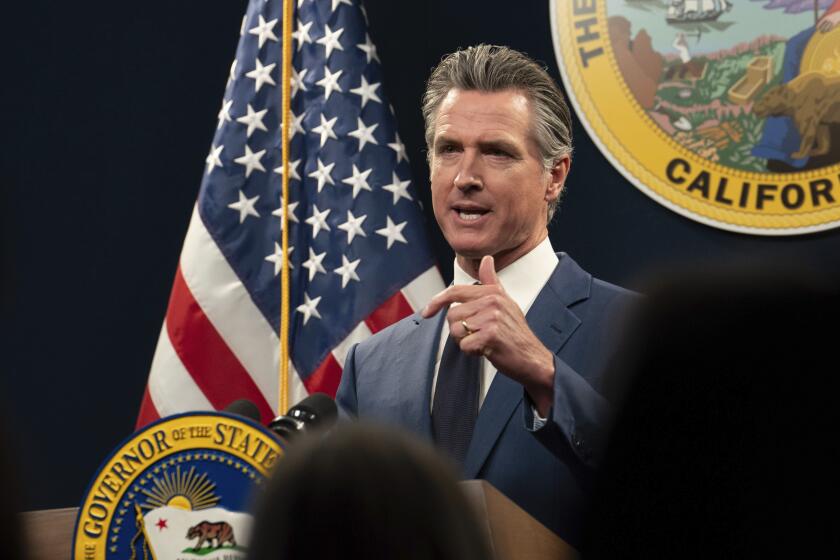Budget Memo Lists Tough Choices for Reducing Deficit : Policy: Options sent to President include raising taxes, cutting benefits. GOP accuses White House of hypocrisy for attacking it over the same issues.
White House Budget Director Alice Rivlin has outlined for President Clinton a broad range of options, including tax increases and cuts in programs such as Medicare and Social Security, that she said Clinton will have to choose among as he plots his fiscal--and political--course the next two years.
Republicans, smarting over Democratic criticism that their proposals for reducing the federal budget deficit would lead to cuts in Social Security and Medicare, are hoping to make political waves with the document.
The “illustrative” package of budget choices Rivlin presented to Clinton in the 11-page memo includes six paths, three of which keep the deficit on a downward track by such devices as capping Social Security for wealthier recipients, taxing benefits, limiting mortgage interest deductions or state and local tax deductions. All are politically explosive.
White House officials this weekend called the Oct. 3 memo “a catalogue” of “what’s out there in the fiscal literature” that is unrelated to proposals Clinton might make.
But by outlining steep entitlement cuts and tax increases as possibilities, Rivlin’s memo, titled “Big Choices,” provides Republicans fuel for their charges that the White House is being hypocritical in attacking the Republicans for signing on to a “contract with America” to, among other things, balance the budget.
The memo, including a Rivlin cover letter to Clinton, was leaked Friday to Republicans, who gave it to the Washington Post.
William Kristol, the GOP strategist who heads Project for the Republican Future, said it was obtained from “a public-spirited senior Administration official” and reflects the “craven hypocrisy” of the White House charges that Republicans would slash Social Security and Medicare.
“The White House is, of course, perfectly within its rights to hold internal meetings to discuss various budget options,” he said, “even including massive tax increases and Draconian entitlement cuts that Rivlin indicates might total as much as $719 billion over five years.
“What is cravenly hypocritical” is that at the same time they are “publicly and falsely accusing Republicans of plotting a similar assault on entitlements” they are discussing doing the same.
Rivlin, in an interview, said the memo, part of early budget planning, was prepared simply “to bring the President up to speed on the debate” and the options “are not necessarily our options.”
She noted that no recommendations were made to Clinton in the proposals and said the memo was part of a “series of meetings on big issues out there.”
White House senior adviser George Stephanopoulos and economic adviser Gene Sperling were more adamant in distancing Clinton from any of the options. Stephanopoulos called the memo a “catalogue” of the fiscal literature, unrelated to any direction Clinton might choose. Sperling said the memo contains items others outside the Administration are proposing that Clinton “never in a million years” would propose.
Late Saturday, White House Chief of Staff Leon E. Panetta added his voice to the White House denials, stating that Clinton “has consistently rejected and he continues to reject any cuts in Social Security.”
Panetta also said Clinton would not cut Medicare except in the context of health care reform and said that cutting those programs are “proposals of our opponents,” despite the Rivlin memo.
But believing the memo provides strong ammunition to Republican candidates being accused by their opponents of wanting to cut Social Security and Medicare, Kristol’s group Saturday began faxing the memo around the nation.
Rivlin offers six illustrative packages that outline a range of paths the President could take, starting with the “current path” to retain the budget deficit at $168 billion during the next five years, a path that would require spending cuts and tax increases of $184 billion in aggregate. Making no changes in federal budget policy would result in a $235-billion deficit by the year 2000.
Other paths would continue “modest” deficit reduction, “steeper” reduction or produce a balanced budget--requiring $689 billion in cuts and tax increases.
The most audacious of the paths, and one that would produce a $211-billion deficit by 2000, outlines $719 billion in cuts and tax increases during five years, putting a chunk of new revenue into the “investment” spending Clinton touted as a candidate but has had difficulty producing because of the need to hold down the deficit.
Under some combinations, massive spending for Head Start, education, national service, training programs, welfare reform and other initiatives is included. Tax reductions for the middle class, such as increased exemptions for children, would be part of some paths.
The most politically volatile proposals, however, are those listed as “Restoring Confidence in Social Security” and “Balance the Budget and Increase Public Investment.”
The Social Security system is projected to run out of money by 2013. The memo outlines a combination of cuts in cost-of-living adjustments, phased-in benefit reductions with a higher retirement age and higher payroll taxes. It would produce $25 billion to $75 billion in deficit reduction over five years, plus balance income and outgo from the Social Security system over 75 years.
Another option, the balanced-budget plan would require large “but progressive” tax increases, freezes on many items in the name of national sacrifice to “put the problem behind us.”
Rivlin’s memo noted that the President’s campaign theme this fall of moving the country forward while Republicans take it backward “must be translated into policy decisions soon after the election.” The Republican “empty promises” must be met after the election with a Clinton program of “explicit and paid-for proposals.”
More to Read
Get the L.A. Times Politics newsletter
Deeply reported insights into legislation, politics and policy from Sacramento, Washington and beyond. In your inbox three times per week.
You may occasionally receive promotional content from the Los Angeles Times.






